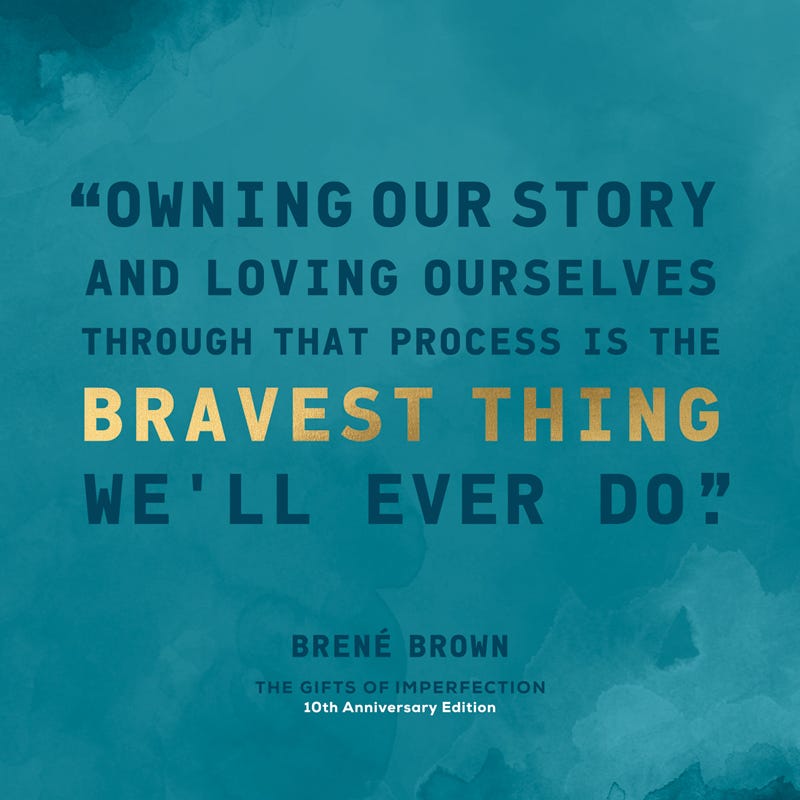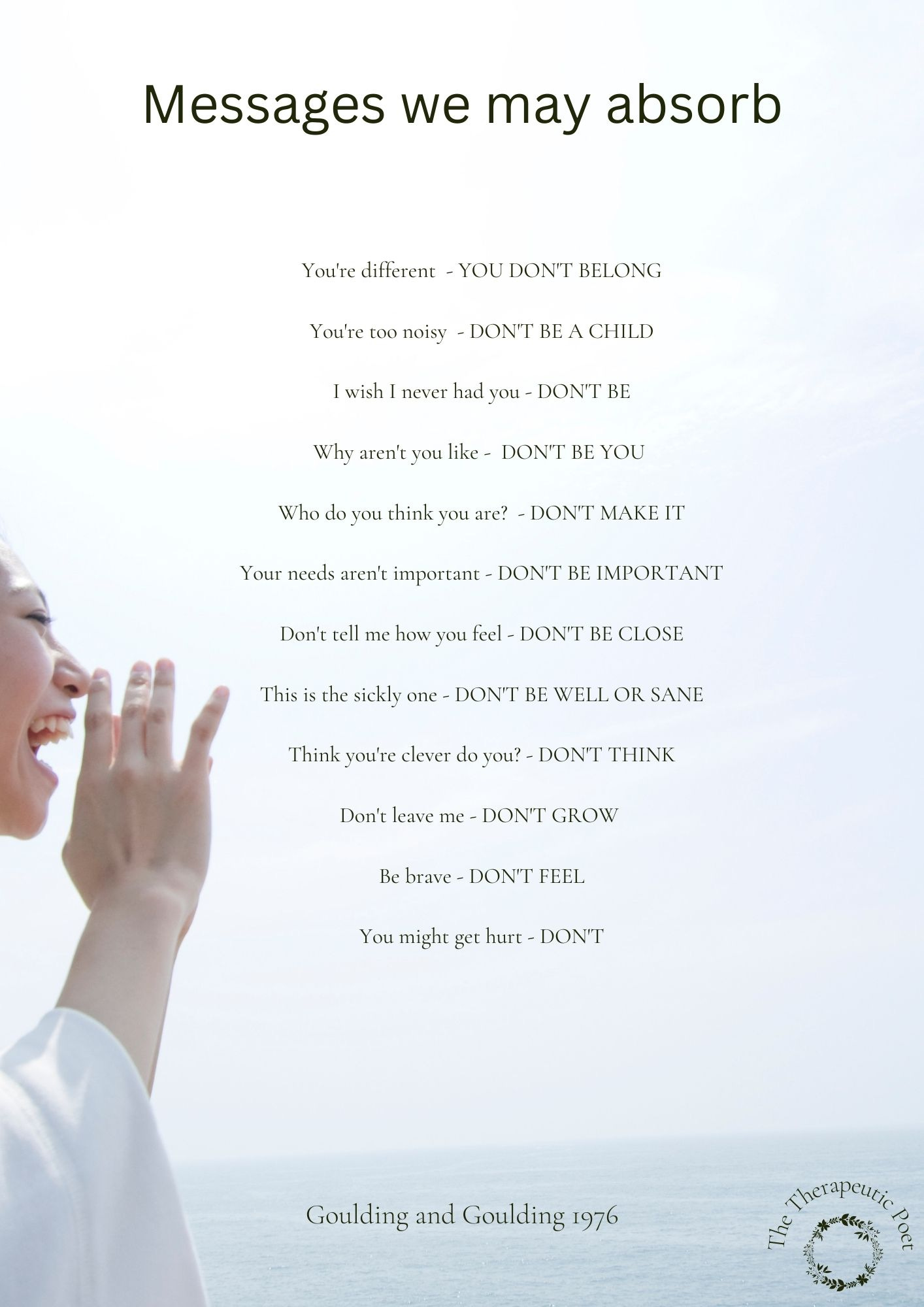Hello dear subscribers,
First of all, thank you for giving me the time and space from your lives to read this. Now, let’s see if I can repay the favour by giving you something worthy of your time.
This newsletter is all about stories; what we tell and what we don’t. And why.
What do you think of the above quote? I wonder how many times ‘owning’ gets mistaken for ‘telling’.
I’ve been thinking a lot recently about owning our stories versus telling them. I’ve noticed a pattern in my latest podcast recordings. They are all with people who are telling difficult stories. Julia Warren telling her story about addiction recovery and losing her husband through drug overdose, Dr. Ingrid Clayton about her step-father’s emotional and sexual abuse, Josh Connolly about his father’s alcoholism and his own recovery journey.
What strikes me about their stories is how much they are embroiled in another’s story too; how each of them expressed a sense of betrayal that they felt at owning and telling their own story, because it involved partially telling the story of someone else.
Each of them acknowledged their sense of freedom because the other protagonist in their story was no longer alive and this somehow gave them permission to freely tell their story. Would they have told those stories if those protagonists were still alive?
What impact does telling our story have if we do decide to tell it? I was interested in Eva Wiseman’s article about what happens after people tell their story. If we tell our stories that involve other people we can run the risk of being scapegoated; accused of causing trouble or being disloyal.
It doesn’t even have to be on a large scale to a wide audience, but telling our story can often leave us with a vulnerability hangover.
Sharing stories is a way to connect, to feel witnessed and validated. Yet those stories have to be received with compassion and empathy for the sharing to be a success. That doesn’t always happen, and it’s not like there is an easy formula to help people through being good listeners, because what we need from a listener when we are telling our story can change.
If we are telling a story in which we still feel shame, any kind of response from a listener is likely to add to the shame. As Brené says,
‘Shame is the most powerful, master emotion. It’s the fear that we are not good enough.’
Where shame resides vulnerability hides.
If we are not ‘good enough’ in our own story, then where do we belong?
The antidote to shame is empathy, which can be really difficult because we all have our shame. Reaching out for empathy through telling our story can trigger someone’s need to ‘get it right’ (perfectionism) or their need for you to ‘just get over it’ (contempt); such reactions are likely to come from their own unhealed shame wounds. Having our stories received in this way can be incredibly soul destroying.
As if other people’s reactions weren’t enough to contend with, we also have our ‘life scripts’.
‘Life scripts’ are an idea that comes from the therapeutic modality of Transactional Analysis. They are basically messages that we absorbed in childhood from our caregivers based on what they did, what they said and what they noticed about you. It’s not even that such things were overtly expressed by our caregivers; it’s just the interpretations that we interalised. Which ones do you recognise that may have threads within your own story?
Is it possible to ‘own’ your story without telling it? Do we need someone to hear our story in order to own it? What if owning our story means that we need to cast certain people in the villain role?
Ultimately I believe that we need to be brave enough to witness our own story and I think that is what Brené means by ‘owning’ it. We have to bring the murky parts out from the shadows, turn them over in our palm, squeeze them to find their contours and hold them like the precious parts that they are, because they are part of us.
So how can we do that?
Approaches that may be useful.
Write a no send letter
Sometimes we need to release resentments and past hurts, but doing so could cause more harm than good. In this case writing a ‘no send’ letter can be useful. In this writing practice you write a letter unloading all of your hurt, disappointment and anger at the person or situation AS IF you were going to send the letter to them.
I can’t emphasise this enough:
DON’T SEND THE LETTER!
I’d recommend that you write it with pen and paper rather than using a keyboard as it helps you connect to your emotions and also helps you to avoid distractions.
Instead, read it out in front of the mirror, to your pet, along to an Alanis Morissette sound track or to a trusted person who has capacity to hear it (they will literally just say ‘I hear you’ after you have read it out) and can honour your confidentiality.
Write your story as if it was a fairy tale.
I use this technique in one of my writing workshops. Start with the standard opening:
‘Once upon a time there was…’
and then tell your story in the third person, so as ‘she’, ‘he’ or ‘they’ instead of ‘I’. Focus on how the character is thinking and feeling. Let your pen flow freely with any metaphors, imagery and quirkiness. Once you have finished writing it, re-read it and ask yourself:
If you think of this as happening to someone else what feelings do you have about your character?
What do you wish to tell the character?
What is on the page that up until now you have not been willing to examine?
What life scripts can you recognise that are emerging throughout your life?
Write your life script as a poem.
It doesn’t have to be good remember! It just has to be reflective of your experience so that YOU witness your own experience. Here’s one of mine:
I am the fault line.
I am at fault, by design .
I shan’t go back to the default.
So…
My fault.
I am the fault line.
Cracked open.
Heartbroken.
I have used all three of these techniques in the continual work of unveiling and owning my own story, as well as using them with clients in my writing workshops.
I found the no send letters particularly useful in the early days when I needed to stop discounting my own truth and believe myself. I found the fairy tale story an incredibly emotional experience as I finally began to have compassion for myself.
I still have parts that are untold, yearning to be seen, to be acknowledged. Those parts I tell through my poetry; as a way to not only process the owning of my story, but to also share it in a way which feels right enough for me. As Emily Dickinson said, ‘Tell all the truth but tell it slant’ .
Years ago I wrote a poem about homelessness after I saw a memorial to people who were homeless and had died on the streets of Austin, Texas. When I was writing this newsletter, I thought back to that poem and wondered if I partially also wrote it for the parts of my own story that I felt I could not tell.
Homeless bumGo on, you’re right - walk on,I’m just a homeless bum,Who doesn’t deserve your glance or cash.No, run on by, off you dash!I’m just a homeless bum.I’m not a survivorWhose nights were scarred,Whose innocenceWas bruised and marred.Who, by anyone’s book‘Has had it hard.’Go on, you’re right - walk on,I’m just a homeless bum.I’m not a survivorWhose flashbacks are near,Who drowns them outWith spice or cheap beer,And lives in walls,Built from fear.Go on, you’re right - walk on.I’m just a homeless bumI slur my wordsSo you can’t make outMy muffled screams,My voiceless shouts;My untold story -So smelly, disgusting,Bloody and gory...Like me.Go on - you’re right, walk on.I’m just a homeless bum.
And I’m curious, what about you? In this culture of sharing all, do you still have untold stories that are yearning to be heard? Are you unsure of how to do that? If so, let me know. I’m thinking about putting a group together called ‘Our untold stories’ where people can have the chance to share and process whatever they need, which will feel vulnerable but not exposing. Where you will be heard in the way you need to be. If you are interested in being involved then let me know.
‘Tell me your story and I’ll guild it with gold’.I’ll tell you my story, but it’s not yours to hold,Not yours to put right or fix into a mould.It’s free and it’s wicked a wild wolf at its heartI won’t make it conform for the sake of your art.
That’s it for now!
‘Til next time.





